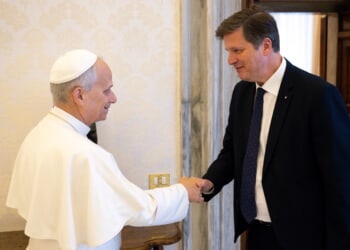Hebrew Scripture has many accounts of great victories, such as Joshua’s conquest of the Holy Land and King David’s many successful battles against his enemies all around. But its pages are also filled with accounts of defeat, destruction and exile.
All are part of sacred history. The Biblical texts teach defeat was a result of our own failings, whatever else might be going on. Conquerors like Nebuchadnezzar are not excused, but our first responsibility is not their evil, but our own.
The Abraham Accords give real hope that we all may choose life .. and so help the cults of victimhood … die a swift, painless, and, natural death.
Why should the Bible not focus on the greater evil of the Babylonian emperor? It is because it is teaching us a great lesson — even in defeat, one still has agency that no conqueror can ever take away. Even in defeat, we justify what happened as an act of Providence from which we may recover and even gain if we learn its hard truth. The alternative is to be stuck in rationalizations and excuses that keep us subservient to something other than truth and truth’s Author.
The late Professor Bernard Lewis pointed out that defeat and persecution were suffered in the formative years of the Jewish and Christian faith communities. Lewis compared this to Islamic history. Islam knew only victory for nearly a century after its founding. It established an empire that stretched eastward, northward, and westward from its birthplace in the Arabian Peninsula, until it stretched all across northern Africa and into Europe. Only there, after a hundred years, was its expansion decisively checked for the first time at Tours, France.
This proved only a breathing spell. Islam survived the brief setback at Tours and later of the Crusades. It recouped from its loss in the Holy Land and went on to expel the Christian kingdom from there. By the middle of the 15th century, the Ottoman Turks conquered Constantinople and ended the Roman Empire that had been officially Christian for more than a thousand years. Constantinople became the home of the caliphate and the conquering Ottoman armies forged on ever deeper into the middle of Europe until it was, at last, twice turned back at the gates of Vienna, in 1529 and again in 1683.
Vienna was the highwater mark of the Ottomans empire and of Islamic empire. Driven by intense civilizational development, Christian Europe began a prolonged ascendancy as the worldly power of Islam entered into a long decline.
Lewis argued that because its formative years were years of triumph and expansion, Islam was ill-equipped to deal with defeat, decline, and exile. The extended decline in power that stretched from the late 1600s deep into the 20th century had no precedent in its history. Its culture preserved few lessons on spiritual wrestling with defeat, and little sacred history of communal self-examination and spiritual regeneration. For centuries, the subservience of Christians, Jews, and others to the Islamic power was attributed to Islam’s being the supreme expression of God’s will. Faced with defeat, and with no model of how to deal with it, believers look to find a powerful culprit to blame for the defeat.
The crushing cognitive dissonance of belief in Islam’s superiority and the reality of Islamic political and economic decline and (often) political subservience weighed heavily on the community. This proved a rich loam for the growth of conspiracy theories.
These metastasized when Jews began to return in numbers to their ancient Jewish homeland, one of the first of Islam’s conquests beyond its Arabian birthplace. That the Jews, whose long exile had begun centuries before Islam’s emergence in the 600s, should successfully forge an independent state in one of the earliest Islamic conquests seemed to some nothing less than satanic. Lewis traces the growth of this kind of thought in his scholarly works, and shows how it dovetailed well with the demonic antisemitism that was offered as the explanation for Russian misery under the Tsars and for German defeat after World War I. (Modern observers tell of the ubiquity of European antisemitic fabrications such as The Protocols of the Elders of Zion and of Nazi literature in Hamas homes and in bookstores throughout the Middle East.)
When one is fighting Satan, the gloves go off. Satan has destroyed the natural order by defeating the True Religion. Therefore, the upholders of the great God are justified in setting aside every restraint in battling God’s enemy.
Such attitudes are known to Jewish and Christian history as well. Case in point: the Reformation. To the militant reformers, the Catholic church had become the Whore of Babylon; to the counter-reformers, the Protestants were heretics deserving of sudden death in the night, doors marked for death on the night of the St. Bartholomew massacres.
The decades of battle that began with the Reformation did not end until the Peace of Westphalia. What rescued Europe from mutual annihilation over religion was the discovery of a deeper organizing principle within the religious tradition itself that allowed it to embrace the diversity that inevitably results from freedom. Hugo Grotius’ scholarship leaned on the Jewish tradition of the Seven Noahide Laws — a basic framework of common laws observed by all, while reserving to nations the freedom to work out the rest of the details by themselves.
However unsatisfactory to some, however imperfectly, Europe forswore the drive for a total victory to affirm religious truth.
The Jewish tradition had provided the cornerstone for this new structure, and it is easy to understand why. Dealing with defeat, learning how not to be defeated by setbacks, was a central part of the Scriptural message.
A particularly good example of this is found in Jeremiah. The prophet addressed the defeated Jews as they went in exile in Babylonia about 2500 years ago. Speaking in God’s name, he instructed the exiles to build a regular life and to be helpful and positive participants in the life of the place where they will live:
Build houses and live in them, plant gardens and eat their fruit. Take wives and beget sons and daughters and take wives for your sons, and give your daughters to husbands, that they may bear sons and daughters. Multiply there, do no decrease. And seek the welfare of the city to which I have exiled you and pray to the Lord on its behalf; for in its prosperity, you shall prosper.
No brooding over the evil that has overtaken them. Go build your lives again, not only with God’s blessing but as a divine task. Plunge into the basics of ongoing life, and so to regain yourself from internalizing victimhood and destroying your life from within.
Jewish life has taken that moral imperative of Jeremiah’s message and expressed it in legal terms as well. The principle in Jewish law is “dina demalchuta — the law of the kingdom is binding by force of Jewish law.” There are exceptions: when the kingdom is so corrupt that it is more like a band of brigands, or if the kingdom decides to use its laws to persecute Jews and suppress Jewish practice.
But the rule that applied most of the time was that, with the force of the Torah itself, one follows the law of the sovereignty in which one finds oneself. This principle guides Jewish communities from within, directing them on Judaism’s own terms to offer their host community exactly what Washington asked of the Jews of the Newport congregation in 1791 — to offer at all times their effectual support. And there is a marvelous historical track record of Jews making major contributions to the life of their host countries whenever they were allowed the chance, both in the Christian and Muslim worlds.
When Lewis pointed out that Islam’s lack of experience with defeat left it prone to conspiracy theories of the most fantastic sort, his desire was to give a roadmap towards something better. He believed in our ability to find a way to peace. For him, there is no reason why Muslims will not develop their own distinctive way forward. Many have already done just that, in full fidelity to their tradition and to God. The example of the Abrahamic religions project in the UAE is a sterling example of this, and it is sad that the professor didn’t live to see it.
But Prof. Lewis’ scholarship continues to allow us to understand why the difficulties that modern times have brought have generated movements that view Christian and Jewish cultures and nations as satanic, why they justify intolerance, intransigence, dissembling, and a commitment to whatever is necessary to re-establish Muslim rule wherever it once had been and to spread it everywhere else.
Progressive academia has a major hand in our continuing ignorance. The academic Left rejected Lewis’ scholarship in favor of the work of Edward Said, whose narrative of colonialism was much more to their taste. The result has been our inability to comprehend the violence and identify the reality of the comprehensive conspiracy-haunted paranoia driving it. As Ayaan Hirsi Ali wrote in response Keir Starmer’s milquetoast cliches offered as a response to the Jihadi assassination of Jews in Manchester on Yom Kippur,
Britain stands at a fork in the road. But the choice is not, as Starmer claimed, between “decency” and “division.” It is between delusion and decision. It is between barbarism and civilization. We have not yet learned sufficiently.
Without the insight of people like Lewis, like Hirsi Ali, we don’t know how to combat the aggressive rationalizations of those celebrating the deaths of the murdered Jews in Manchester or in Israel. We fear they must have something right.
But there is a piece missing, the same piece missing in Hitlerism or tsarism or Communism — the piece that enables one to suffer defeat, learn from it, and grow. The piece that enables us to always be free even when outwardly conquered. The piece that enables us, even if victimized, to refuse to define ourselves in the end as victims. The piece the violent Islamists and their fellow travelers are missing.
Identifying the truth here is what enables a great civilization to regain and exceed its former greatness. The Abraham Accords give real hope that we all may choose life, as God implores us to do, and so help the cults of victimhood and their terrible paranoia die a swift, painless, and natural death.
Read a little of Lewis. Try Semites and Antisemites as a starter. The truth within it can help anyone be a powerful agent for change in a world that needs that very much. What confronts us in the Middle East and on our cities’ streets becomes more understandable. When we understand what we face, we can forge intelligent policy that moves away from delusion and toward real peace.
READ MORE from Shmuel Klatzkin:
From Berlin to Gaza, the Cult of Death Marches On
We Must Have Diversity and Unity
The Religious Foundations of Freedom and Democracy







![Keith Ellison Caught Promising to Fight State Agencies for Somali Fraudsters [WATCH]](https://www.right2024.com/wp-content/uploads/2026/01/Keith-Ellison-Caught-Promising-to-Fight-State-Agencies-for-Somali-350x250.jpg)


![Florida Officer Shot Twice in the Face During Service Call; Suspect Killed [WATCH]](https://www.right2024.com/wp-content/uploads/2025/12/Inmate-Escapes-Atlanta-Hospital-After-Suicide-Attempt-Steals-SUV-Handgun-350x250.jpg)





